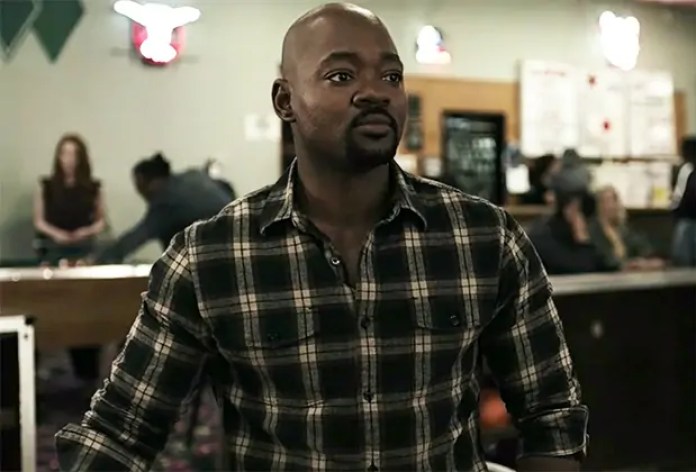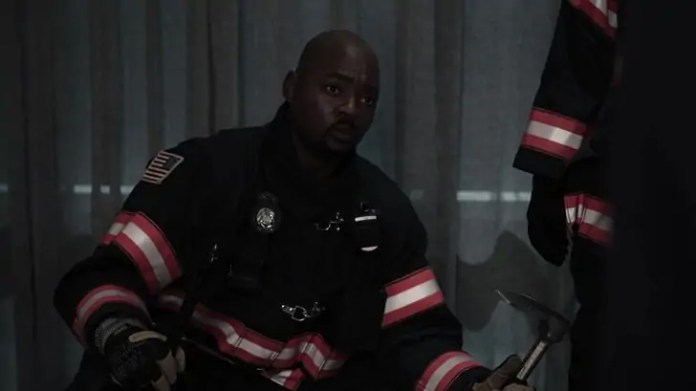Welcome to the 23rd installment of our 2020 Pride Month Series! Each day in the month of June, we will be highlighting a different member of the LGBTQ+ community who we think is a great example of representation and dynamic characterization. We will focus on fictional characters, celebrities, and activists alike — the positive voices within the LGBTQ+ community and in mainstream media.
As the first out transgender man to have a series regular role on network television, Brian Michael Smith plays Paul Strickland, a transgender firefighter, on 9-1-1: Lone Star. Smith is an advocate for trans representation in the media and makes it a point that his roles are very specific to what he represents. Paul Strickland is just that. As a transfer from a fire station in Chicago, he’s still trying to find his footing with the 126. He quickly makes a new family and tries to find relationships along the way, which could either be easy or hard. Keep reading to find out why both Brian and his character deserve a spot in this year’s Pride Month Spotlight.

In 2015, after studying at Kent State and doing commercials and off-Broadway work, Smith had roles in Girls, Law & Order: SVU, and Homeland. Soon after, he landed the role as a trans man in the show Queen Sugar, using that to come out as transgender himself. Since then, Smith has landed numerous transgender and cisgender roles, including The L Word: Generation Q. When talking to fellow 9-1-1: Lone Star co-star Ronen Rubinstein on his Instagram Live recently, Smith revealed that when he was looking for jobs, he got really specific with the roles he wanted. At first, he just wanted to act on TV, but they kept telling him he had to be more specific, as in what show and what type of character. Smith had to ask himself what he wants to do and why. He wanted to be on shows like Queen Sugar and do roles he’s never seen before, be a trans-masculine character, and have a story that reaches the audience. His first role like that was on Queen Sugar, as a trans-masculine cop, on a Black show. It was a positive representation of a Black man. He says when he did it that way, writing down exactly what roles he wanted, it felt like he did have some control over it.
Aside from acting, Smith also devotes time to mentoring programs for the LGBTQ youth and advocating for the Black Lives Matter movement. The newest Netflix documentary, Disclosure, follows leading trans creatives and thinkers as they share their perspectives and analysis about Hollywood’s impact on the trans community. In the documentary, Smith talks about how interesting it is when you look at things historically in terms of trans-masculine experience. He says there’s no vocabulary back in the day of trans anything.
“Not only were we looking at gender expression, but at also the racist expectations. The white person becomes this high-society dandy, like the ideal of what a man should be, but then her handmaid is forced to take the seed. She becomes this aggressive valet who’s violent.”
Smith says that even in this gender-transgressive fantasy, you still have white characters in blackface playing these horribly fantastical versions of Black people. When talking about seeing the representation of trans women more than trans men on television, Smith says he thinks trans men aren’t as recognizable and that there’s this idea that people don’t know any trans men or that they don’t really exist because people don’t visibly see them.
This month, New York Pride announced that Smith would lead a rally against police brutality as part of the city’s Pride Month. In 2018, he took part in Variety’s Transgender in Hollywood Roundtable with Laverne Cox, Alexandra Billings, Jen Richards, and Trace Lysette to talk about the realities of being transgender and working in Hollywood. As part of FOX’s #TVforAll campaign for Pride Month, he sat down for a roundtable to talk about Pride, Black Lives Matter, and more with GLAAD, Alexandra Grey, Peppermint, and 9-1-1: Lone Star costar Rafael Silva on June 22. For #TVforAll, Smith said:
“[I] would love to see more queer superheroes, action heroes, and romantic leads who happen to be LGBTQIA, and more projects that populate the world of the show with diverse characters without preface. I’m hoping to see more TV shows and films that center characters who are LGBTQIA+ without centralizing their sexuality or gender identity.”
In 9-1-1: Lone Star, Paul Strickland is first introduced halfway through the pilot episode when Owen and T.K. Strand are interviewing potential candidates for the 126. In a flashback scene in Chicago, Paul takes down a guy who turned out to be an arsonist, even though he didn’t even indicate he had a gun on him. Paul says he got lucky, but Owen tells him he has a stack of life-saving commendations, which tells him he has the gift of threat assessment. Owen asks him if he sees that as having anything to do with him being trans. Paul says growing up the way he did, there were a lot of folks who wanted to hurt him. He guesses he learned to figure out who they were before they figured out who he was. At first, Paul declines Owen’s offer to transfer to the 126, saying he tried another job in Chicago and that was hard enough. He doesn’t imagine what things are going to be like down in Texas. However, Owen tells Paul that there’s someone in Austin who is just like who he was, feeling scared and hopeless. He’d like Paul to show him, her, or they it’s okay to be who you are. That sells Paul, and he officially joins the 126, creating a brand new family where he feels safe.
In the fifth episode, the crew take a call at a male strip club, and Paul helps a woman named Josie because she has glitter in her eyes. The two hit it off, and Josie even brings a gift basket for Paul at the firehouse the following day, leaving her number inside the basket. Later on, while working out, Mateo tells Paul his phone is blowing up; it’s Josie. Paul tells Mateo and T.K. that they’re texting and she’s “almost-too-good-to-be-true cool.” Maybe he wants to enjoy the fantasy of what could be before reality inevitably finds a way to disappoint. T.K. and Mateo try their best to stay positive for Paul, but he tells them things are a bit more complicated for him. He usually meets women on a dating app, and everything’s in the profile, no surprises. Paul says when it comes to sharing something that personal, you go by the Rule of Threes. He has to assume when he tells one person; he’s telling three. T.K. tells him that straight, gay, bi, or trans, dating sucks, and there’s no way around it. Analyze the risk, and if he feels safe, he takes the leap.
Paul and Josie finally go on a date at the bowling alley, and all seems to be going well, even making plans for another date. Towards the end of the night, though, Paul tells Josie there’s something they haven’t talked about yet. The next day at the firehouse, Paul begins to tell T.K. how the date went, but he sees Josie outside, wanting to talk to him. Josie tells him she’s embarrassed by how she reacted, saying she owes him an apology. She can’t stop thinking about him. She really likes him; he is literally the man of her dreams. But Josie says she guesses she’s not as evolved as she thought she was. She does like Paul, but she doesn’t think this is something she can get past. That night after his shift, Paul walks outside the firehouse to find T.K. and Carlos sitting against Carlos’ car. T.K. tells Paul he’s coming out with them, and they’re not taking no for an answer. Paul assumes T.K. told Carlos about him and Carlos just responds with, “you’re straight?” He doesn’t judge. The three get to a dance club and party the night away. Dating may not come easy to Paul, but what does is his family at the 126 who support him and accept him for who he is.

Just as his friends are there for him, Paul is always there for them. In the third episode, when the team is responding to a call at a grain silo, Marjan and T.K. get trapped in the corn, and when they finally come out, Marjan’s hijab falls off, and Paul and the 126 immediately surround her, so she can put it back on. When Marjan is asked to leave her mosque because a video of her hijab falling off goes viral, she doesn’t know what to do. The team is at a bar, and Paul senses something is up with her. Marjan admits she got slut-shamed at the mosque, and they told her she needs to find another place to worship because she’s too proud. Paul asks her what she thinks, and she says she’s proud but also weirdly ashamed at the same time. If Marjan likes the mosque, Paul tells her not to let them shame her for being proud. He says she strut in there with her hijab held up high. In the eighth episode, after T.K. is shot, the 126 show up at the hospital and just wait. Carlos goes into T.K.’s room alone, and after a while, Paul is the first one to come in and puts a hand on Carlos’ shoulder, indicating that he’s there for him like Carlos was for him.

Like his character, Smith is there for friends, family, fans, and especially the Black and LGBTQ+ community. Whether it’s advocating for the equality of all Black and LGBTQ+ lives or inspiring people on network television, letting them know they don’t have to be afraid to be who they are, Smith is a role model to all. He uses the experiences he had before, during, and after transitioning and what he learned from that to share through his work as an artist. Although not much is known about what type of storylines season 2 of 9-1-1: Lone Star will have, there’s no doubt that Brian Michael Smith, and Paul Strickland, will be inspiring more fans to be themselves.

Season 1 of 9-1-1: Lone Star is streaming now on Hulu, and season 2 is expected to premiere sometime during midseason in 2021 on FOX. Catch Smith on Queen Sugar on Hulu and Disclosure on Netflix.

